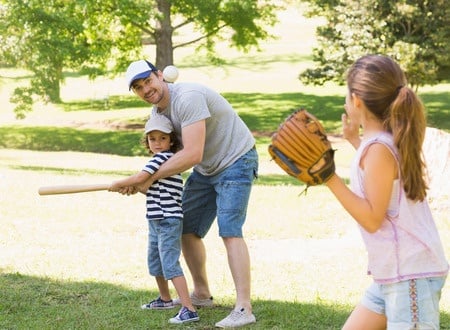Summer’s almost here, and along with it comes lots of outdoor work and play that can expose your eyes to an assortment of seasonal risks. Here are five eye safety tips that can keep your eyes (and the eyes of your significant others) summer-safe.

Five Tips to Keep Your Eyes Safe This Summer
1. Summer sports means flying objects — don’t become a statistic
Golf, baseball, volleyball, badminton, softball, soccer, archery and more — many summer sports are about things small and large zipping through the air, sometimes with unfortunate results. It’s estimated that more than 40 percent of eye injuries are sports- or recreation-related.
You can purchase low-cost, impact-resistant specialized eyewear for sports from any sporting goods store and almost every major online retailer. It’s an easy way to make sure you, your spouse and your children don’t become statistics.
2. Fireworks — even the “safe” kind can hurt you
Fireworks send more than 10,000 people a year to emergency rooms, with about 38 percent of those admissions comprising of injuries to the eyes, head, face and ears. And it’s not just “unsafe” fireworks that are behind these numbers — sparklers and bottle rockets accounted for 15 percent of the injuries.
The experts agree — if you and your family want to really enjoy fireworks, go to a professional exhibition run by experts. If you plan to use consumer-grade fireworks, make sure you and any bystanders wear eye protection and never let children handle any fireworks, even sparklers without adult supervision.
3. Sunglasses — cool-looking protection that’s all about healthy eyes
Outdoor activities expose the eyes to UV (ultraviolet) radiation that can damage the cornea and increase the risk of cataracts and some cancers. UV radiation is present on cloudy as well as bright sunny days, so make eye health a personal priority and wear sunglasses any time you’re outdoors.
For maximum protection, select sunglasses that offer complete protection against both types of UV radiation: UV-A and UV-B (look for sunglass labels labeled “UV400” or “100% UV Protection”). Wraparound designs offer superior side-angle protection, and make sure that the kids — even toddlers — wear a hat and sunglasses when they’re outdoors.
4. Summer allergies – the pollen forecast is your friend
If summer allergies catch up with you, your runny nose may be accompanied by itchy, weepy or swollen eyes. Check the pollen forecast daily and, if possible, limit your outdoor activities on high pollen days. In your home, make sure to wipe down any surfaces that may have been dusted with pollen.
If you’re planning outdoor activities, sunglasses can help reduce your eyes’ exposure to pollen and spores. Contact lens wearers should remove them and wear their glasses during high pollen days – just one more way to reduce exposure.
5. Swimming pools – contact lenses off, goggles on
It’s easy to forget to remove your contact lenses before jumping in the pool, but immersing your lenses in non-sterile solutions increases the risk of bacterial infections. Take them off and follow the lens makers’ instructions on cleaning and care.
The lifeguards at your local swimming pool try to make sure that the right balance of chemicals are being used, but that doesn’t mean you or your kids won’t experience some eye irritation after a dip. Get goggles for everyone in the family and avoid that burning sensation that can last for hours.
During the summer, or at any time of the year, when you have your annual eye exam, we recommend that you include optomap. To find a provider near you, visit www.optomap.com.